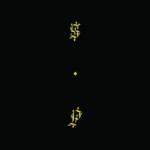
Shabazz Palaces Black Up
(Sub Pop)
2011 has already seen a good deal of creative, forward-thinking hip-hop that is helping redefine our perceptions of the genre. I’m not just talking about the ubiquitous Odd Future collective, but also self-styled weirdo Lil B, avant-garde viscera from Death Grips, and hazy, gorgeous soundscapes from producer Clams Casino; it’s becoming a more multidimensional genre. Rap veteran Ishmael “Butterfly” Butler won a Grammy in 1993 with jazz-rap trio Digable Planets, but he’s created an entirely different, less accessible persona as “Palaceer Lazaro” with Shabazz Palaces. Black Up is rightfully the most acclaimed experimental hip-hop album of the year – it’s fresh and idiosyncratic, compellingly cryptic, but it’s difficult to pinpoint the effect it has on the listener.
Shabazz Palaces reject the phallogocentric dogma of hip-hop, creating an amorphous, challenging record; their braggadocio centres on how much more cerebral and inventive they are than their contemporaries. It’s pronounced most directly on Yeah You, a diss track that’s not so much directed at an individual as an entire hip-hop ideology, as Butler targets the regression of the hip-hop scene with a wordplay that’s purposefully obtuse: “You’re spiritually blasé / Your devolution’s so passé”. The songs often meander into these puzzling, sonically obscured lyrics, and this idea of an anti-(language)-devolution is important to understanding the subjective multiplicity of the meanings of Shabazz Palaces’ work. Interpretation is flux. But after ample abstract food for thought, Butler’s message is grounded by the repeated taunt “you corny”, delivered with a justified sneer of superiority.
They’re not entirely without precedent: although Butler warns on Free Press And Curl, “Don’t compare my beat with his!”, their way of thinking recalls cLOUDDEAD and Company Flow, as Shabazz Palaces occupy a liminal, almost ambient space, with their shuffling beats and hazy atmospheres. Like cLOUDDEAD especially, songs are fragmented, boundaries unclear, and words are chosen for intellectual, psychedelic effect rather than to build a narrative of any sort. On Are You... Can You... Were You? (Felt) there’s a lyric you’d never expect a rapper to utter: “I can’t explain it with words / I have to do it”. Words are not explanatory but have active properties, language is used as another emotive tool, with a similar function to the beats, and indeed there are a few moments where vocals are buried unintelligibly in the mix for subtle subconscious effects.
This is hip-hop that doesn’t attack; it drifts. Black Up is full of ghostly howls and weird barely-there percussion, devoid of anything like a single. There are a few faded memories of African drumming, at one point a disembodied thumb-piano solo drops like rain into An Echo From The Hosts That Profess Infinitum. Elsewhere, Endeavors For Never (The Last Time We Spoke You Said You Were Not Here. I Saw You Though.) floats through fragments of textures from Moondog-esque jazz samples to UFO laser synths, strung like beads across THEESatisfaction’s soulful guest vocals. These beats are structured so unconventionally that it’s a wonder Butler dared rap over them; you struggle to align yourself to this music, but it’s rewarding to acquaint yourself with Shabazz Palaces’ freeform, deconstructive tendencies.
It’s an intentionally daunting work of art, but a fascinating enigma. At first, the album might breeze past you leaving only a few repeated phrases stuck in your mind – “It’s a feeling”, “You know I’m free”, “Who do you think who you are?”, “Clear some space out, so we can space out”. These mantras are as close to Shabazz Palaces get to a chorus, and at first they’re clues with which to approach the record. Black Up’s closing line couldn’t be more fitting: “And still it morphs – this shit is way too advanced”. As it ebbs away, you’re left in awe of their captivating invention.
9 August, 2011 - 07:37 — Stephen Wragg